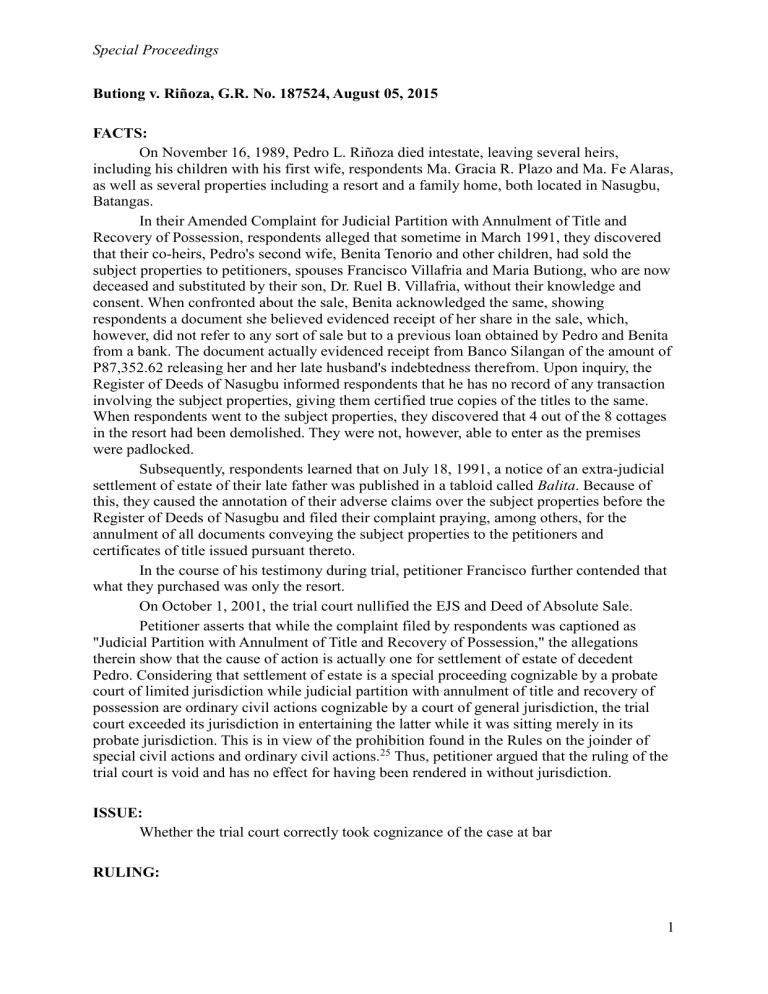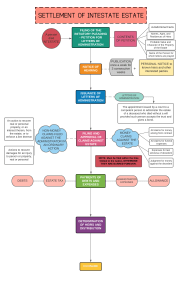
Special Proceedings Butiong v. Riñoza, G.R. No. 187524, August 05, 2015 FACTS: On November 16, 1989, Pedro L. Riñoza died intestate, leaving several heirs, including his children with his first wife, respondents Ma. Gracia R. Plazo and Ma. Fe Alaras, as well as several properties including a resort and a family home, both located in Nasugbu, Batangas. In their Amended Complaint for Judicial Partition with Annulment of Title and Recovery of Possession, respondents alleged that sometime in March 1991, they discovered that their co-heirs, Pedro's second wife, Benita Tenorio and other children, had sold the subject properties to petitioners, spouses Francisco Villafria and Maria Butiong, who are now deceased and substituted by their son, Dr. Ruel B. Villafria, without their knowledge and consent. When confronted about the sale, Benita acknowledged the same, showing respondents a document she believed evidenced receipt of her share in the sale, which, however, did not refer to any sort of sale but to a previous loan obtained by Pedro and Benita from a bank. The document actually evidenced receipt from Banco Silangan of the amount of P87,352.62 releasing her and her late husband's indebtedness therefrom. Upon inquiry, the Register of Deeds of Nasugbu informed respondents that he has no record of any transaction involving the subject properties, giving them certified true copies of the titles to the same. When respondents went to the subject properties, they discovered that 4 out of the 8 cottages in the resort had been demolished. They were not, however, able to enter as the premises were padlocked. Subsequently, respondents learned that on July 18, 1991, a notice of an extra-judicial settlement of estate of their late father was published in a tabloid called Balita. Because of this, they caused the annotation of their adverse claims over the subject properties before the Register of Deeds of Nasugbu and filed their complaint praying, among others, for the annulment of all documents conveying the subject properties to the petitioners and certificates of title issued pursuant thereto. In the course of his testimony during trial, petitioner Francisco further contended that what they purchased was only the resort. On October 1, 2001, the trial court nullified the EJS and Deed of Absolute Sale. Petitioner asserts that while the complaint filed by respondents was captioned as "Judicial Partition with Annulment of Title and Recovery of Possession," the allegations therein show that the cause of action is actually one for settlement of estate of decedent Pedro. Considering that settlement of estate is a special proceeding cognizable by a probate court of limited jurisdiction while judicial partition with annulment of title and recovery of possession are ordinary civil actions cognizable by a court of general jurisdiction, the trial court exceeded its jurisdiction in entertaining the latter while it was sitting merely in its probate jurisdiction. This is in view of the prohibition found in the Rules on the joinder of special civil actions and ordinary civil actions.25 Thus, petitioner argued that the ruling of the trial court is void and has no effect for having been rendered in without jurisdiction. ISSUE: Whether the trial court correctly took cognizance of the case at bar RULING: 1 Special Proceedings YES. The allegations of respondents in their complaint are but customary, in fact, mandatory, to a complaint for partition of real estate. Particularly, the complaint alleged: (1) that Pedro died intestate; (2) that respondents, together with their co-heirs, are all of legal age, with the exception of one who is represented by a judicial representative duly authorized for the purpose; (3) that the heirs enumerated are the only known heirs of Pedro; (4) that there is an account and description of all real properties left by Pedro; (5) that Pedro's estate has no known indebtedness; and (6) that respondents, as rightful heirs to the decedent's estate, pray for the partition of the same in accordance with the laws of intestacy. It is clear, therefore, that based on the allegations of the complaint, the case is one for judicial partition. That the complaint alleged causes of action identifying the heirs of the decedent, properties of the estate, and their rights thereto, does not perforce make it an action for settlement of estate. It must be recalled that the general rule is that when a person dies intestate, or, if testate, failed to name an executor in his will or the executor so named is incompetent, or refuses the trust, or. fails to furnish the bond required by the Rules of Court, then the decedent's estate shall be judicially administered and the competent court shall appoint a qualified administrator in the order established in Section 6 of Rule 78 of the Rules of Court. An exception to this rule, however, is found in the aforequoted Section 1 of Rule 74 wherein the heirs of a decedent, who left no will and no debts due from his estate, may divide the estate either extrajudicially or in an ordinary action for partition without submitting the same for judicial administration nor applying for the appointment of an administrator by the court. The reason is that where the deceased dies without pending obligations, there is no necessity for the appointment of an administrator to administer the estate for them and to deprive the real owners of their possession to which they are immediately entitled. In this case, it was expressly alleged in the complaint, and was not disputed, that Pedro died without a will, leaving his estate without any pending obligations. Thus, contrary to petitioner'.s contention, respondents were under no legal obligation to submit me subject properties of the estate to a special proceeding for settlement of intestate estate, and are, in fact, encouraged to have the same partitioned, judicially or extrajudicially, 2


